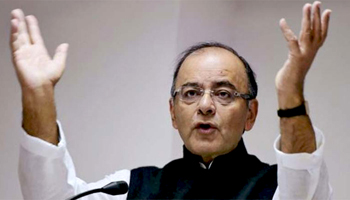New Delhi, Dec 28: The BJP on Sunday sought a public apology from Delhi Chief Minister Arvind Kejriwal for his allegations against Arun Jaitley, noting there was no mention of the finance minister in the report of the city government's inquiry panel into DDCA affairs. The AAP leader retorted by asking why Jaitley was "afraid" of a probe if he had done no wrong.
 Talking to reporters here, BJP spokesperson M.J. Akbar said that Kejriwal had sought to target Jaitley by alleging that the Central Bureau of Investigation team that raided the office of his principal secretary had gone through a file relating to the Delhi and District Cricket Association (DDCA) but noted that the inquiry report does not talk of Jaitley.
Talking to reporters here, BJP spokesperson M.J. Akbar said that Kejriwal had sought to target Jaitley by alleging that the Central Bureau of Investigation team that raided the office of his principal secretary had gone through a file relating to the Delhi and District Cricket Association (DDCA) but noted that the inquiry report does not talk of Jaitley.
"Delhi Chief Minister Arvind Kejriwal should apologise to Arun Jaitley. He should apologise publicly," Akbar said.
He said the inquiry committee had been set up by the Aam Aadmi Party government and there was no allegation against Jaitley.
"There is no mistake by Jaitleyji and all mistakes by Kejriwalji (in blaming him). Kejriwal himself will be in the dock," he said, adding: "You cannot run the government on the basis of showmanship."
Dismissing suggestions that the panel had not gone into the accusations against individuals, Akbar said the panel's mandate had been "to prepare summaries of irregularities, if any, by DDCA, its officials and members".
Bharatiya Janata Party secretary Shrikant Sharma also attacked AAP and the Congress over their demand for Jaitley's resignation.
"It is old habit of AAP to tells lies, sell them and then wriggle out. They have a habit of throwing muck at others," he claimed, adding Jaitley had a long and distinguished public life and nobody had raised fingers at him.
He attacked Congress over the National Herald issue saying that its top leaders Sonia Gandhi and Rahul Gandhi were on bail in the case.
"They (AAP and Congress) are trying to spoil the image of the prime minister and finance minister out of frustration and through propaganda," he said.
Akbar said Kejriwal should "admit to criminal defamation in the court."
The AAP has been demanding resignation of Jaitley, accusing him of involvement in alleged irregularities in DDCA during his term as chief of the association.
Kejriwal reacted, by posing questions to Jaitley.
"Why is Jaitleyji afraid of facing enquiry," Kejriwal tweeted.
"That's the difference between BJP and AAP. AAP takes strong and swift action on credible evidence. BJP defends corruption n runs away from investigation," he added.
Meanwhile, the three-member inquiry panel, in its report, has recommended that DDCA be immediately suspended by the BCCI in light of the large number of allegations against it.
"Considering the large number of allegations against DDCA, it should be immediately suspended by the BCCI," the committee said in its 247-page report.
The report by the committee, headed by Principal Secretary, Vigilance, Chetan Sanghi, reveals went deeply into the affairs of the national capital's cricket association, referring at length to a host of issues, including alleged irregularities in the cost of reconstruction of the Ferozshah Kotla Stadium and complaints of forgery in age verification certificates.
It was also revealed during the investigation that there was no record of tenders for most of the contracts issued by the DDCA and many companies that were given contracts for construction and related work were actually owned by the office-bearers of the cricket governing body.
The report also mentioned that the DDCA has contravened section 211 of the Companies Act which stipulates mandatory disclosure of accounts by a non-profit company.





Comments
Add new comment